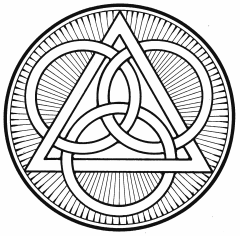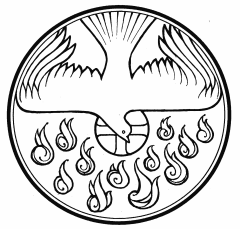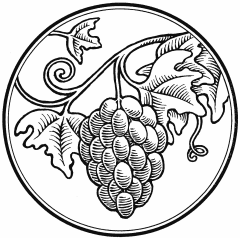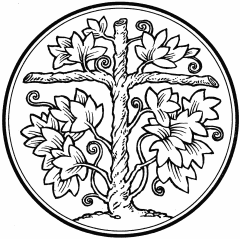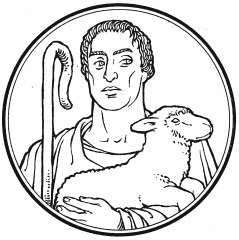Grace, mercy, and peace to you from God our Father, and from our Lord and Savior, Jesus Christ, amen. The text for the sermon is the Epistle, which was read earlier.
While on vicarage, one of the things we did was to take the youth on a camping trip to Nolin Lake State Park in Kentucky. Everything was fine during the trip. The weather was perfect, until the freak summer storm hit. When the rain started it was light, but it didn’t take long for it to turn into what seemed like a flood. Once we got everything at the campsite secured, we turned our attention to ourselves. The only thing that provided us any protection were the tents that we had. They provided us with adequate coverage, but the security of a four-walled building would have been better. We knew that the tents we were using were only temporary, but at that moment, they were our security from the storm.
In this earthly life, we live in nothing but a tent. Sure, some of those tents are pretty nice and they look and feel great, but in the end, the tent will be destroyed. In this tent we groan, and the source goes far beyond rain and storms: because of sin, our bodies and lives face plagues of worry, trouble, disease and death. So, while we live in this tent, we rejoice amidst the groans because we have a building from God, “a house not made with hands, eternal in the heavens.” Jesus has gone to prepare a mansion for us, and we look forward to the time that we move from this tent and get to go home.
For Paul, he knows with all certainty, that a house “eternal in the heavens” awaits him because that is what God has said. God in the presence of Jesus Christ has given us a promise: “In my Father’s house are many rooms. If it were not so, would I have told you that I go to prepare a place for you? And if I go and prepare a place for you, I will come again and will take you to myself, that where I am you may be also.”
Do you know who that promise was made to? That promise was made to you. It was promised to you in your Baptism when God placed His name upon you. There in the water, God gave you this promise of an eternal house.
When we read Paul’s letter, does it seem interesting to you that rather than fearing when this earthly tent is destroyed, he instead actually looks forward to it? Listen to what he says: “…so that what is mortal may be swallowed up by life.” Death isn’t an eternal death, at least, not for Paul. Death isn’t an eternal death for you either. Death isn’t an eternal death at all for the Christian, for when we die, we merely die an earthly death and receive everlasting life. That is the message that he shared with the Romans when he says, “For we know that the whole creation has been groaning together in the pains of childbirth until now. And not only the creation, but we ourselves, who have the firstfruits of the Spirit, groan inwardly as we wait eagerly for adoption as sons, the redemption of our bodies.” Paul had no worries when it came to death. The same, however, could not be said for those to whom Paul wrote and visited.
To those whom Paul wrote and visited, they knew that they had salvation because it had been preached to them and taught to them regularly. However, it was how a person received that salvation that was at stake here. Salvation came from a person’s keeping of the Law and their various good works. That same thought was prevalent during the time of the Reformation and what was being taught by the Roman Catholic Church. Even today we hear the same thing. Today we hear from very influential megachurch pastors that preach a salvation that is based solely on what you do. But that is not what is found in Scripture. Instead we hear Jesus say, “I am the way, and the truth, and the life. No one comes to the Father except through me.” Jesus never says that salvation can be found outside of Him, but that is what was taught at the time of Jesus and that is what is taught today.
What assurance of all of this do we have? Can you really trust the word of Jesus? This could be all that there is. This tent in which we live in may be all that we have. Some may say that this is all that we have, that there is nothing beyond this. However, we know that that is not the case. We know that there is something beyond this life, something beyond earthly riches. We know this because we have been given “the Spirit as a guarantee.” The Lord has given a down payment, a deposit guaranteeing what is to come. The Spirit, who called us by the Gospel, keeps us in faith, and dwells in us is the guarantee of what is to come. Combined with the promises of the Father and of Jesus, the Spirit’s promise to us is one that is most certainly true.
We can now walk through this life with confidence, no matter what our situation, no matter what difficulty or hurt we face. We can be confident that our God is good for His promise of life. We need not fear death or the things that happen to our body. As long as we are in these bodies, we are away from the Lord. Paul recognized that and even longed for death. His longing for death was not simply a wish to be unclothed. Rather, death for Paul, as well for every Christian, is not an escape. It is entry into life in its fullest. It is “[putting] on our heavenly dwelling.”
We are able to look forward to that building which God has built because of our faith. Through faith and not by sight are we able to believe that which God has given to us. Even our Lord Himself says “Blessed are those who have not seen and yet have believed.” That is why you walk by faith, not by sight. That is why, when it comes to the tent and the house, you close your eyes and you open your ears. You hear God’s Word, and it is there that you find your comfort and joy, because it’s there that you hear the faith in which you walk.
Just what is this faith that you hear? God created man in His image to be perfect. Through the fall into sin, man lost that image and forever tastes death. Because of sin and death, God sent His Son into this sinful and fallen world in order to redeem it. He did this for a purpose: to prepare a place in heaven for you. He became flesh in order to die for you. He took every infirmity that afflicts your body and life, and bore it on the cross so that those may not curse and torment you forever. He bore every sin that would rob you of life and suffered God’s judgment for them – so that you might be forgiven your sins and delivered in God’s time from this tent of suffering to the eternal home of heaven. In the name of Jesus, amen. Now the peace of God that passes all understanding, keep your hearts and minds through faith in Christ Jesus, amen.
